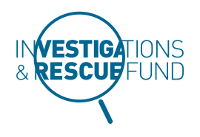Triple F Farms, Inc.
(Triple F), is a Bradford County, Pa.-based ferret-breeding factory farm whose
animals are sold to laboratories around the world and pet stores across the
U.S., including Petland. Triple F boasts that it is “one of the largest
and [most] esteemed ferret producers in the world” and that “[o]ur
babies are very special to us.” But
PETA’s undercover investigation exposed a massive breeding mill keeping thousands of ferrets confined in crowded,
filthy, stiflingly hot barns, where animals suffered chronic neglect and died
on a daily basis.
Based on evidence that
PETA presented to federal and state law-enforcement
officials before releasing the case publicly, the U.S. Department of Agriculture inspected Triple F and the Bradford
County District Attorney’s
Office has opened an investigation of Triple
F.
The horrific suffering
of ferrets documented
by PETA’s investigator is detailed below. After you
read about the plight of these animals, please take action to help them here.
PETA’s
investigation found that ferrets were kept grouped in small cages with
dangerous metal wire floors, deprived of any opportunity to engage in natural
behavior such as burrowing or hiding, and often deprived of food and water. Newborn,
young, and adult animals were systematically denied basic and veterinary care
for even painful, life-threatening injuries and conditions.
Bloody rectal
prolapses, gaping wounds, herniated organs, ruptured and bleeding eyes,
infected feet, and inflamed, swollen mammary glands are just some of the
ailments that PETA’s investigator saw ferrets suffering and sometimes dying from
during her employment at Triple F. Help these ferrets now by taking action. PETA’s
investigator routinely brought to the attention of Triple F ownership,
management, and supervisors the suffering of individual ferrets at the facility
but to no avail. The investigator’s repeated requests for care and speedy euthanasia
to relieve suffering were met with blank stares, shoulder shrugs, and general
indifference, as the investigator was instructed
to “just leave” ferrets as they were.
Hundreds of newborn and young ferrets fell through the gaps
in the wire cage bottoms 3 feet to the waste-covered concrete floors below,
where they were left to writhe and cry, and they often died of dehydration or
starvation within sight of their mothers and siblings. Triple F forbade its
workers—including PETA’s investigator—to pick up the dying newborns. Many of
them were consequently run over, maimed, and/or killed by carts used to move
food and supplies through the facility’s aisles, and many others were stepped
on and buried in feces. PETA’s investigator also saw ferrets thrown into the trash—and into the facility’s
incinerator—while still alive. Take action now to end this cruelty.
Read more about PETA’s findings here and excerpts from our investigator’s notes.
Triple F did not have a staff veterinarian to examine and
treat the 6,000 or more ferrets it keeps confined in its sheds on any given
day. Lay employees worked in a dusty “surgery room” and
used unsterilized instruments—including a dull needle and a razor blade—over
and over again to cut organs and anal sacs from ferrets who were not
anesthetized properly and “woke up” and cried out. Despite claims on
Triple F’s website that the facility was visited weekly by a veterinarian, PETA’s
investigator never saw a veterinarian or veterinary technician at Triple F in
nearly four months of working there.
PETA has submitted formal complaints to seven federal and
state agencies and is calling for investigations and appropriate charges
including criminal charges. However, we also
need you to take action
now to help the thousands of ferrets who are suffering at Triple F!
Also, please remember that the animal overpopulation and homelessness
crisis is not limited to dogs and cats. Ferrets and other small mammals are
also bought on impulse and then left at animal shelters when people have grown
tired of them. If you’re willing to open your home to
a ferret, please adopt from an animal shelter or rescue group. There are
hundreds around the country, so search online or ask your local humane society
for a group near you.
Article source: PETA Action Alerts


